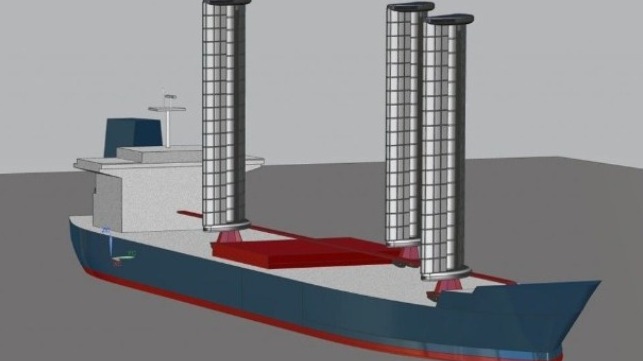Wind Propulsion Project Using Yacht Racing Technology

The latest project to bring wind propulsion technology to commercial shipping is seeking to leverage the experience and technology developed in world-class yacht racing to a new generation of tankers and dry bulk carriers. Cargill, a leader in the global food industry, is launching a project with BAR Technologies, a company formed to commercialize technologies developed in America’s Cup yacht racing, and naval architect Deltamarin to develop the new wind-powered ships.
"Through this partnership, we will bring bespoke wind solutions to customers who are actively seeking to reduce CO2 emissions from their supply chain," said Jan Dieleman, president of Cargill's Ocean Transportation business. "Changing regulations and uncertainty about future greener marine fuels makes choosing the right vessel to charter with a long-term view complicated. With the WindWings technology, Cargill will be able to offer customers a solution that improves vessel efficiency, independent of the fuel or type of engine used," he continues.
The project centers on using BAR Technology's WindWings, large, solid wing sails that measure up to nearly 150 feet in height. The concept calls for fitting those sails to the deck of bulk cargo ships to harness the power of the wind and reduce CO2 emissions by as much as 30 percent. Formed in 2016 as a spin-off from Ben Ainslie Racing (BAR), the British team formed by Olympic and World Champion sailor Sir Ben Ainslie, BAR Technologies leverages the design knowledge, technical skills, and intellectual property developed for America's Cup yacht racing for commercial industry.
"Wind is a near marginal cost-free fuel and the opportunity for reducing emissions, alongside significant efficiency gains in vessel operating costs, is substantial,” said John Cooper, Chief Executive Officer, BAR Technologies. “We've invested in our unique wind sail technology to provide vessel owners and operators with an opportunity to realize these efficiencies."
Deltamarin, which has designing efficient cargo vessels and introduce new technologies to commercial shipping, has also been carrying out research and development studying how to reduce the greenhouse gas emissions of ships. Among the technologies they have been studying is wind-assisted propulsion.
The project is currently in the design phase, bringing together a team of companies to deliver the first vessels which they expect to introduce in 2022. The team is starting with designs for product tankers before moving to dry bulk vessels. According to BAR, one of the benefits of the wing sail is that it can be tailored to the size of the vessel and the route it will take.

that matters most
Get the latest maritime news delivered to your inbox daily.
"Cargill's endorsement of our technology is a very significant step forward at the forefront of the industry, said Martin Whitmarsh, Chairman, BAR Technologies.
Cargill as one of the industry's largest players, chartering a fleet of more than 600 vessels at one time, believes that it can play a leading role to accelerate decarbonization progress. Cargill is also active with several initiatives, including the Global Maritime Forum and its Getting To Zero Coalition, the Sea Cargo Charter, a recent initiative to track emissions from chartered ships, and the Maersk McKinney Moller Center for Zero Carbon Shipping.
